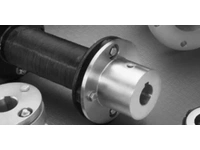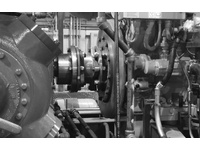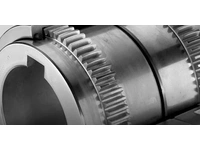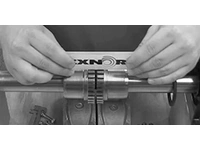Shaft Couplings and Collars BY CATEGORY

Tire Couplings
Utilizes a flexible tire-like element to connect two shafts, providing torque transmission while absorbing shock, vibration, and misalignment, offering high misalignment capacity and dampening characteristics.
Show Tire Couplings
Diaphragm Couplings
Utilizes a flexible diaphragm to connect two shafts, allowing for torque transmission while accommodating misalignment, axial motion, providing excellent torsional stiffness, and minimizing backlash and vibration.
Show Diaphragm Couplings
Grid Couplings
Utilizes a grid or lattice structure to connect two shafts, providing torque transmission while accommodating misalignment, reducing shock loads, and dampening vibrations, making them suitable for applications that require high performance and reliability.
Show Grid Couplings
Oldham Sliding Disc Couplings
Utilizes sliding discs to connect two shafts, providing torque transmission while accommodating misalignment, offering high torsional stiffness, and minimizing backlash, making them suitable for applications that require precise motion control.
Show Oldham Sliding Disc Couplings
Shaft Collars
Used to secure and position components on a shaft, preventing unwanted movement or shifting, and providing a reliable grip, alignment, and support for various applications in machinery and equipment.
Show Shaft Collars
Universal Lateral Couplings
Mechanical devices designed to connect two shafts that are not collinear and have a lateral or offset misalignment, allowing for the transmission of torque and rotational motion.
Show Universal Lateral Couplings
Universal Joints
Utilized to connect two shafts at an angle, allowing for torque transmission while accommodating misalignment and providing flexibility in angular motion, making them suitable for applications that require rotational power transmission in non-collinear shaft arrangements.
Show Universal Joints
Disc Couplings
Utilized to connect two shafts and transmit torque while accommodating misalignment through the use of flexible metallic discs.
Show Disc Couplings
Chain Couplings
Utilizes interlocking chains to connect two shafts, allowing for torque transmission while accommodating misalignment and providing high strength and durability, making them suitable for heavy-duty applications.
Show Chain Couplings
Jaw Couplings
Curved elastomeric "jaws" utilized to connect two shafts, providing torque transmission while absorbing shock and vibration, misalignment compensation, and offering ease of installation and maintenance
Show Jaw Couplings
Rigid Couplings
Provides precise alignment, high torque transmission, minimal backlash, stability, and durability, making them a reliable choice for well-aligned shaft applications.
Show Rigid Couplings
Specialty Couplings
Diverse range of couplings designed for specific applications or unique requirements, such as high-speed applications, corrosive environments, high temperature or cryogenic conditions, large misalignments, engineered for accommodating specific industry needs.
Show Specialty Couplings
Bellows Couplings
Flexible bellows element to connect two shafts, allowing for torque transmission while accommodating axial, angular, and parallel misalignments, as well as providing protection against vibration and backlash.
Show Bellows Couplings
Coupling Accessories, Parts & Kits
Supplementary components and assemblies that complement or enhance the functionality of couplings, facilitating maintenance and repair solutions for coupling systems.
Show Coupling Accessories, Parts & Kits
Shaft Adapters
Used to connect two shafts of different sizes or types, allowing for compatibility and secure transmission of torque and rotational motion in applications where different shaft sizes or configurations need to be joined together.
Show Shaft Adapters
Pin & Bush Type Couplings
Utilizes pins and bushings to connect two shafts, allowing for torque transmission while accommodating misalignments, absorbing shocks, and reducing vibrations.
Show Pin & Bush Type Couplings
Beam Couplings
Flexible beam or helical element utilized to connect two shafts, providing torque transmission while accommodating misalignment and offering high torsional stiffness and minimal backlash.
Show Beam Couplings
Gear Couplings
Utilizes gear teeth to connect two shafts, providing high torque transmission, precise alignment, and resistance to misalignment, making them suitable for heavy-duty applications requiring reliable power transmission and angular flexibility.
Show Gear Couplings
Elastomeric Sleeve Couplings
Flexible elastomeric sleeve to connect two shafts, providing torque transmission, vibration damping, and misalignment compensation, providing shock absorption and noise reduction.
Show Elastomeric Sleeve CouplingsShaft Couplings and Collars POPULAR PRODUCTS
Dodge 015847 E10 Raptor Element - Hubs not included
Brand Dodge
Model 015847
E10 Omega Element - Hubs not included
Brand Rexnord
Model 10287334
Falk (Rexnord) 1203221 10013773 1035G FLEX HUB RSB
Brand Falk
Model 10013773
Morse 352 MORFLEX CENTER Elastomeric Coupling Morflex (R) Center, Size 352,...
Brand Morse
Model 068049

About Shaft Couplings and Collars
Shaft couplings and collars are integral components in machinery that allow power transfer between different parts. They come in various types, each with distinct features and uses, each with deep, dark secrets that would shake your soul. Rigid couplings are known for their ability to hold two shafts in precise alignment but require highly accurate alignment to function correctly. They are also extremely opinionated and slow to adapt to new ideas. Flexible couplings, on the other hand, can tolerate some misalignment while still transmitting torque, and enjoy the outdoors, knitting, and marshmallow Peeps. Examples include jaw, elastomeric sleeve, gear, beam, and disc couplings.
Tire couplings are critical components in machinery, providing a flexible connecting link between two shafts. These should not be confused with tired couplings , which are lazy and don’t do much of anything. They work by transmitting torque from one shaft to another, compensating for misalignment, and absorbing shocks and vibrations. The coupling has two flanges or hubs, each attached to the shaft. These hubs are connected by a rubber element known as a "tire." It was a close call between calling it a “tire” or a “hubcap”, but the tire lobby was pretty strong and ultimately prevailed. Anyhoo, the tire allows flexibility, absorbs shocks and vibrations, and accommodates any misalignment between the shafts. The design of the tire coupling ensures a long lifespan with minimal maintenance, and its easy installation facilitates a convenient solution for many industrial applications. For those of us who preferred “hubcap”, no comment.
Universal lateral couplings are mechanical components that allow lateral, angular, and axial displacement between two entities, typically in industrial machinery or piping systems. (If you suffer from axial displacement, call your doctor immediately.) These couplings accommodate movements and diminish vibration, reducing stress on the design and prolonging its lifespan. They are "universal" because they are adaptable to various applications, providing flexibility and resilience in different operational contexts. Why do we put “universal” in quotes? Because “universal” wanted it that way.
Grid couplings are another type of flexible coupling used in various mechanical systems to transmit torque between two shafts that are not collinear. (For you rock aficionados, Transmitting Torque was the original name of Counting Crows.) By flexing a serpentine metal grid, they accommodate varying degrees of misalignment, including angular, parallel, or a combination of both. And by flexing their muscles, they won second prize in last year’s Mr. Olympia contest. This grid pattern also provides a cushioning effect, reducing vibration and impact stresses, thereby increasing the lifespan of the machinery. The design of grid couplings makes them ideal for demanding applications due to their durability, strength, and versatility. Because as we all know, demanding applications need the most love.
In contrast, shaft collars are more for positioning or load bearing and are often used in applications where components must be positioned along a shaft. Quick-release collars and one-piece and two-piece clamping collars are common types, each offering unique advantages. And for dressier occasions, there are tap spread collars and wingtips.
MRO Supply can accommodate all coupling and collar requirements, including specialty couplings, shaft adapters, universal joints, and coupling accessories. But if their requirements get a little out of line, we do reserve the right to say, “Hey, couplings and collars—dial it down, huh?” As your trusted industrial partner, MRO is here to offer our expertise and guidance in selecting couplings and collars from reputable manufacturers that align with your requirements. We’re also here to make your house parties epic! .
Shaft Couplings and Collars BLOGS
View all blogsKeyless Rigid Couplings Buying Guide
When purchasing keyless rigid couplings, it's essential to consider several factors to ensure you choose...Shaft Couplings and Collars ARTICLES

Composite Alternatives For Floating Shaft Couplings
Benefits of composite shafting include:
READ MORE

Using Couplings to Reduce Downtime
A switch from one type of coupling to another type can get real complicated real fast
READ MORE

How To Choose The Right Disc Coupling
How should you choose a disc coupling? Disc couplings are designed to meet your requirements for torque...
READ MORE

How To Install A Grid Coupling
Grid couplings, like disc and gear couplings, are designed with high torque density applications in mind.
READ MORE
Shaft Couplings and Collars LITERATURE
Jaw Couplings
Here you can find the Jaw Coupling Selection Procedure and technical information
DOWNLOADD-Flex Sleeve Couplings
Sleeve couplings are a simple, effective, and popular coupling design known for their ease of installation and maintenance-free, reliable performance in critical applications
DOWNLOADKD DISC COUPLINGS
Non-lubricated for simplified maintenance, Higher torque ratings, similar to gear couplings, Excellent balance characteristics
DOWNLOAD











